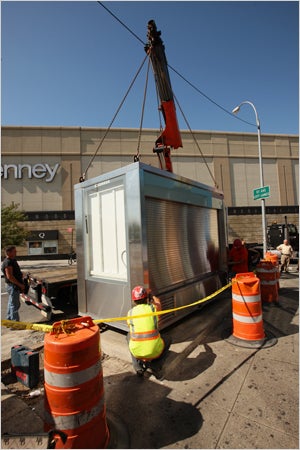New pitches for “street furniture”

Philadelphians had a chance on Monday to hear from four companies that will probably be bidding for the city’s new 20-year contract to install and maintain street furniture.
The city is preparing to release a request for proposals for a street furniture contract covering bus shelters, bike racks and information kiosks and held the meeting to get ideas about what should be included in the RFP.
Representatives from CBS Outdoor, CEMUSA, JCDecaux and Clear Channel Adshel made presentations to residents, activists and Rina Cutler, deputy mayor for transportation and utilities, at the Academy of Natural Sciences.
Joe Minott of the Clear Air Council and Mary Tracy of SCRUB, an advocacy group for public space, stressed the importance of balancing aesthetics with the need for advertisements.
While advertisements on bus shelters and other public furniture are “how we can make this happen,” Tracy asked, “how much is enough?”
Minott also stressed the importance of maintaining the bus shelters, criticizing CBS for its handling of the current contract.
“Oversight is critical,” he said.
The contract won’t cost the city money. Instead, the company which wins it will sell advertisements and will get a part of that to cover capital and maintenance costs. Any extra money will go into the city’s general fund.
“Any revenue we can generate … we are looking at very, very closely,” Cutler said.
The current contract, which provides for more than 260 bus shelters, has brought in about $10 million in revenue.
Cutler said the RFP will preserve the 12 sculpture bus shelters on Chestnut Street and the 27 arts in transit shelters maintained by the Center City District and will also look at expanding current amenities by doing things like adding more bus shelters.
She also assured members of the arts community that special rates it has for advertising at downtown bus stops will be preserved, and possibly expanded, in the new contract.
The city will probably break the RFP into two parts, she explained, with one segment covering bus shelters and asking for designs and plans for other street furniture like honor boxes for newspapers and public information kiosks. Another segment will deal with plans for maintaining the street furniture network.
The RFP is expected to be released by the end of the year, and bids will be considered by a committee including Cutler’s office, SEPTA, the Planning Commission and the Law Department.
All four companies expressed some trepidation that the contract may not cover newsstands, which are owned by the vendors and can include advertising. The JCDecaux representative said that the arrangement could depress advertising prices.
An outline of the four companies’ presentations follows:
CBS Outdoor
CBS’ representative, Richard Ament, stressed the importance of clear guidelines in the RFP, saying that his company is concerned with maintenance problems at city bus shelters.
“We’re not a design company,” he said, explaining that CBS contracts out design of street furniture and focuses on building advertising models to fund city’s street furniture programs.
CBS prefers to have street furniture designs presented to them by the city. It will then fabricate the furniture, sell advertising for it and work to maintain it.
JCDecaux
Bernard Parisot, president and co-CEO of JCDecaux North America, presented his company as a design firm, noting that architect Robert Stern had designed bus shelters for the company.
He said that the company invented street furniture by designing the first bus shelter 45 years ago and that “we pride ourselves in our attention to quality.”
JCDecaux runs the bike share system in Paris (Cutler said a bike share system probably won’t be included in the RFP) and has contracts for Chicago, Boston, San Francisco, Los Angeles and St. Louis.
Parisot said that JCDecuax funds bus shelters and other street furniture in outlying neighborhoods by concentrating advertising in downtowns, where street traffic is higher and advertising space commands better prices.
CEMUSA
Mark Madden, director of business development at CEMUSA, pointed out that his company exclusively focuses on street furniture and has the world’s largest contract, with the city of New York.
“Street furniture is the only medium that we sell,” he said, adding that CEMUSA ensures that advertising doesn’t become too intrusive by performing line-of-sight studies at bus stops.
The company also usually avoids advertising on products like park benches and garbage cans, and, he said, is committed to using environmentally sustainable business practices. Many of its bus shelters are solar powered, made of recycled materials and cleaned by environmentally friendly solvents.
Madden also said that the firm focuses on hiring local residents for jobs and usually opens up offices in cities where it has contracts.
Clear Channel Adshel
Clear Channel Adshel is the world’s biggest outdoor advertiser, with $3 billion a year in revenue.
Clear Channel representative George Kauker noted that the firm has contracts in Washington, D.C., and San Francisco and is active in 30 countries.
He said that the company minimizes on-street disturbances related to furniture installation by doing most construction in the warehouse and that it utilizes an online reporting system to coordinate responses to maintenance requests.
Let the Mayor’s Office of Transportation and Utilities know what you think about the street furniture concepts by completing this survey.
Survey link:
http://www.zoomerang.com/Survey/?p=WEB229S67Z8US3
Contact the reporter at campisi.anthony@gmail.com
WHYY is your source for fact-based, in-depth journalism and information. As a nonprofit organization, we rely on financial support from readers like you. Please give today.



